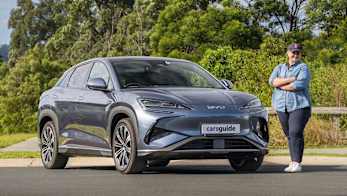When the GST was introduced in Australia back in 2000, by that great friend of the Aussie Battler, John Howard, there were many negative Nancy naysayers who said it would cause our cost of living to spiral out of control.
You watch, they moaned, tugging at their hair shirts, one day soon we’ll be paying $4.00 for a coffee, $10.00 for a schooner and $20.00 for a burger. What a pack of pessimists, eh?
Some 18 years later, we’re all so used to paying 10 per cent more for things, to help out a government that already had one hand in our pay packets, but decided they could use the other hand to catch more of our money when we tried to spend it, that it’s barely a shock when talk comes up of further raising the rate of GST.
Fortunately, we don’t have to pay GST when we buy a house - governments are already making enough of a killing on stamp duty - but when it comes to the second most expensive purchase most of us will make in our lives, a car, it may come as a surprise to learn that there’s even GST applied to something that expensive.
Happily, there is one way of avoiding it, albeit a slightly risky one.
GST on new cars
The price advertised for new cars includes taxes like GST, and luxury-car tax, but these are not broken out the way 'on-road costs' are. So, if your new car is listed at $30,000, fear not, you won’t have to pay $33,000 once GST is included.
The law requires that new-car dealers make that part of the advertised purchased price, which means the price is actually slightly higher than it would be if we didn’t have a GST. This is just one of the many, many reasons Australia’s new cars are so expensive.
Effectively, if you buy a new car for $25,000, there is already $2273 of GST included in your car purchase.
And if you're buying what’s deemed a 'luxury car', which means a car priced from as little as $63,184, you’re getting a double whack, because you’re paying luxury car tax of 33 per cent as well. This is also included in the price, so while you’re feeling the pain, at least you’re not seeing it.
The dealer, on the other hand, is very much feeling it, because they have to charge you more with all that tax included (and then whack you with stamp duty on top, as part of your on-road costs). Which makes it harder to sell.
GST on second-hand cars
What really makes dealers unhappy, however, is the fact that they have to charge you GST on used cars, but there is no GST on used vehicles bought privately.
So, if a private seller wants to sell you a car for $10,000, that’s what they charge you, but if you are buying it from someone who is registered for GST - and any car dealer will be, otherwise they’re making so little money they’ll soon be broke - they have to charge you $10,000, plus $1000 GST.
As you can imagine, this makes people like the Motor Trades Association of Australia very annoyed.
“A used car bought privately, from a private seller's driveway, is not subject to GST but an identical car bought from a dealer does attract GST,” Richard Dudley, MTAA chief executive complains. "It's inequitable.”
He added that private sellers are under no legal obligation to provide a warranty, nor indeed any consumer protection, as dealers are, which means putting GST on the sale of a second-hand motor vehicle from a dealer puts them at a competitive disadvantage.
"The dealer loses one-eleventh of the selling price to GST to the government."
As a consumer, of course, this doesn’t sound like such a bad deal and it means you can, or should be able to, get a cheaper car by buying privately, but it was always thus. And doing so comes with all the associated risks, particularly the lack of warranty.
Claiming GST on car purchase
One of the exciting bonuses of running your own business, aside from the risk and the tax terrors of doing your own BAS every three months, is that you are, if you’re earning enough to collect GST, able to claim a GST credit on the purchase of a car for your business, under certain circumstances.
The amount of GST you can claim is limited to the business use of the asset, of course, in this case your asset being one with four wheels. If it’s 100 per cent used for business - i.e. you’re a courier or a tradie - the you can get 100 per cent of the GST you paid for it returned to you.
A few years back, in 2015, a very generous man named Joe Hockey announced a temporary rebate for small businesses that allowed them to claim a deduction on 'tools of trade' valued at up to $20,000, which meant that a lot of car companies started finding ways to sell their vehicles for $19,990.
Previously, small businesses and sole traders would have to defray their refunds on such a purchase over eight years, but the changes meant the deduction was 100 per cent available in the year of purchase.
This meant sole traders would be eligible for a refund of up to $8500 on a $20,000 vehicle purchased for work, while small businesses could take a refund of up to $5400 on the same car, or ute.
Sole traders who were lucky enough to find themselves in the maximum tax bracket of 47 cents in the dollar stood to make the most gains, while companies with a turnover not exceeding $2 million could be eligible for an instant refund of 30 cents in the dollar.
Cars worth more than $20,000 - otherwise known as 'nice cars' - would still be deductible over eight years.
Last year, in an announcement that caused much smiling at car companies like Hyundai and Toyota, the write-off threshold of $20,000 was extended until June 30, 2018.



.jpg)



.jpg)






.jpg)





.jpg)


.jpg)